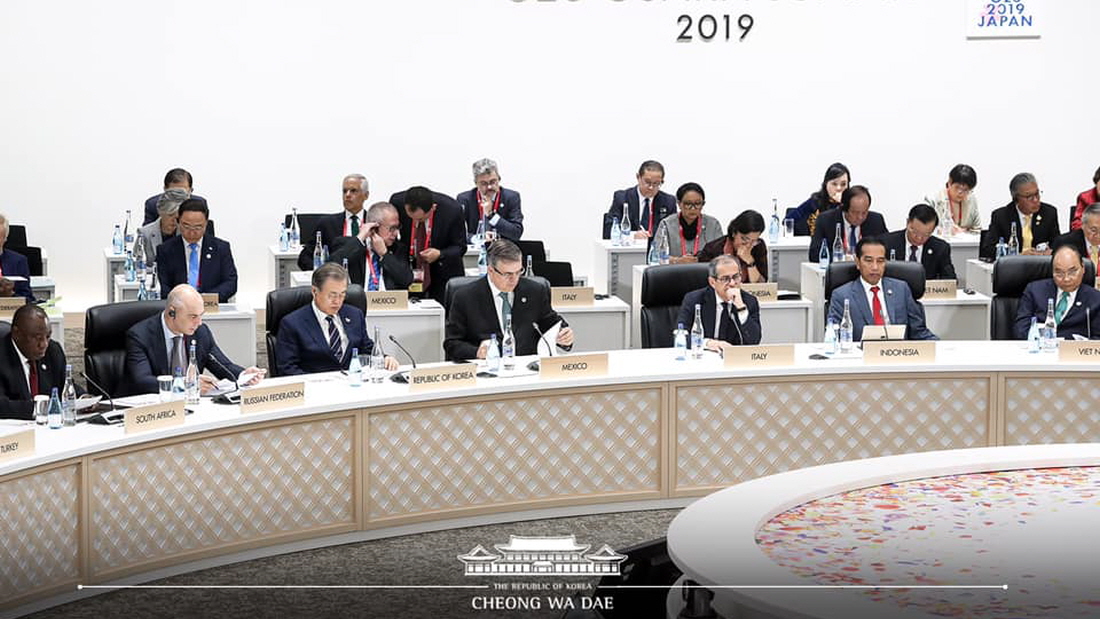이 웹사이트는 제19대 대통령 임기 종료에 따라 대통령기록관이 「대통령기록물 관리에 관한 법률」에 의해 이관받아 서비스하는 대통령기록물입니다. 자료의 열람만 가능하며 수정 · 추가 · 삭제는 불가능합니다.
다만, 「개인정보보호법」에 의하여 개인의 정보를 보호받기 원하시는 분은 관련 내용(요청자, 요청내용, 연락처, 글위치)을 대통령 웹기록물 담당자(044-211-2253)에게 요청해 주시면 신속히 검토하여 조치해 드리겠습니다. 감사합니다.
SPEECHES & REMARKS
BRIEFINGS
Remarks by President Moon Jae-in as Lead Speaker at Third Session of 14th G20 Summit in Osaka, Japan

Thank you, Mr. Chairman.
In order for us to create a “human-centered future society” together, we should reduce inequality and pursue inclusive and sustainable growth.
When it comes to such issues as inequality, the socioeconomic divide and aging population, in particular, a single nation acting alone cannot find solutions. Before the situation gets even worse, we must all gather our strength and employ preemptive measures.
I believe now is the time for the Group of 20 to shoulder a stronger sense of responsibility and duty for humanity.
Sharing policy cases makes a good starting point for cooperation.
Aiming to overcome issues linked to its socioeconomic divide and aging population, Korea has unveiled a strategy to become an inclusive nation for coexistence and mutual benefit. The Korean Government is also expanding the social safety net in such areas as employment, welfare and healthcare.
Starting next year, a Korean-style unemployment allowance will be introduced. It addresses blind spots where unemployed young people, women having trouble restarting their careers and microbusiness owners are ineligible for employment insurance benefits. The employment support services and income subsidies will be expanded for all job seekers from low-income families. Importantly for women, my Government will make utmost efforts to improve their social participation, address career discontinuity and create more jobs.
A concrete roadmap has also been put in place to help realize sustainable development goals. Korea is joining global efforts as well. As part of the endeavors to assist with sustainable development in developing countries, Korea plans to more than double its ODA volume by 2030. In addition, Korea will implement people-centered development policies, thereby raising its contributions to social values and the environment. I'd like to note that the G20 has taken a huge step forward by endorsing the Principles for Quality Infrastructure Investment.
A majority of countries are dealing with challenges posed by aging populations. International cooperation regarding population aging has to be strengthened further, given the economic consequences for the world and individual nations – namely, shrinking working-age populations, weakening growth potentials, worsening socioeconomic divides and increasing financial burdens.
It should be noted in particular that the chair country has been paying keen attention to demographic changes and the issue of population aging. A G20 report on population aging, which has been issued for the first time, is a truly meaningful achievement.
Its effectiveness could increase further still if – at the G20 level – comparative research on the statistics and policies related to population aging were conducted.
If population aging is an inevitable future, we need to initiate a creative paradigm shift to turn it into a new opportunity.
First of all, domestic policies for labor structure reform from a macroscopic view are necessary in each member country to respond to demographic changes. Increasing women’s economic participation is all the more important.
International discussions and cooperation will further assist these efforts. I support the fact that the G20 report on population aging stresses cooperation between countries.
Distinguished heads of state,
There is another place where fundamental changes in perceptions, creativity and international cooperation are desperately required. That is the Korean Peninsula, which is now ushering in an era of peace overcoming a 70-year-long Cold War structure and division.
There has been a lot of progress over the past one and half years thanks to full support and backing from the international community. The leaders of the two Koreas and the United States have met each other face to face and continue to exchange personal letters, advancing the peace process on the Peninsula.
I express special thanks to the United States, Japan, China and Russia for fulfilling their responsibilities and roles to achieve complete denuclearization and the settlement of peace on the Korean Peninsula while demonstrating unwavering commitment to dialogue and negotiation.
Peace is the cornerstone of sustainable development. The era of a peace-driven economy on the Korean Peninsula – when peace leads to economic development, which in turn further solidifies peace – will bring benefits to all. I am confident that it will provide a new growth engine for the economy not only on the Korean Peninsula but also in Northeast Asia and the rest of the world.
When diverse channels of dialogue and cooperation are up and running, as seen in Prime Minister Abe’s recent proposal for a North Korea-Japan summit without any conditions, there will be a growing understanding that peace can bring mutual stability and economic benefits and serve individual interests.
I hope that we G20 leaders will be able to pool our wisdom and resolve for the sustainable development of humanity.
Thank you.



